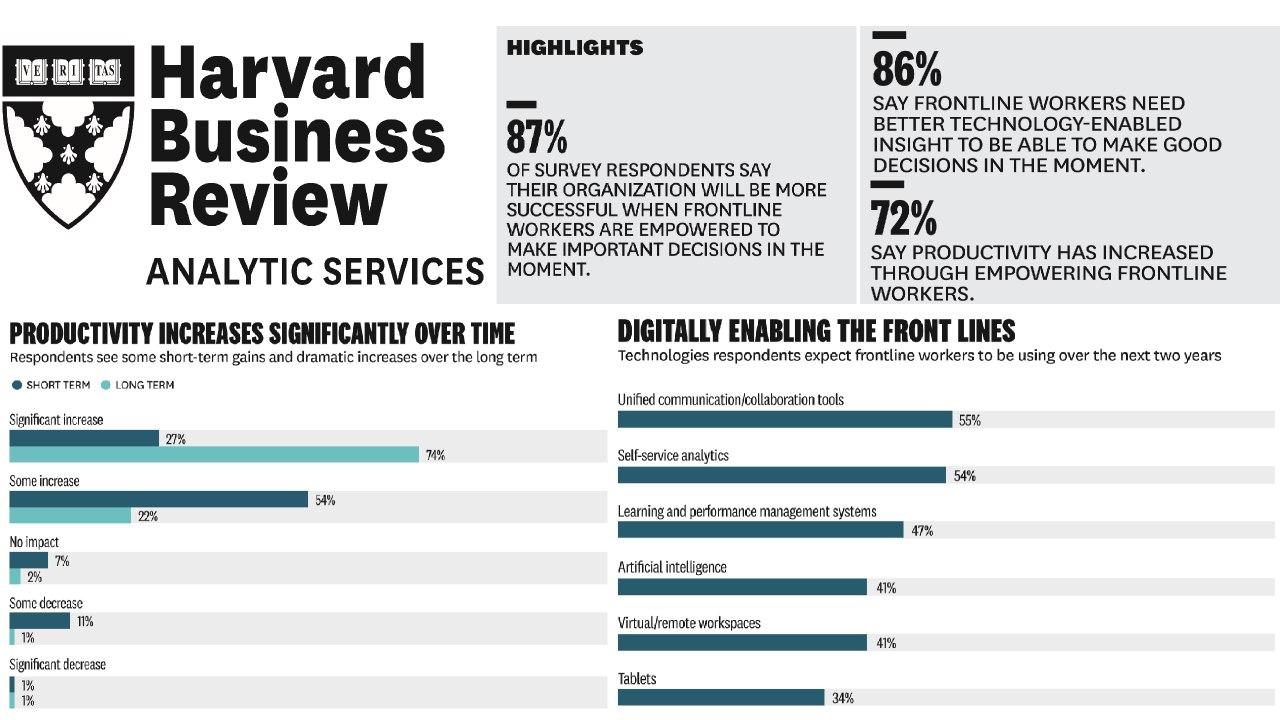Summary For Harvard Business Review Research: THE NEW DECISION MAKERS
Front-line workers are employees who are the first point of contact between organizations and their customers or who work in a company’s product or service operations. These include salesclerks, nurses, flight attendants, maintenance workers, electricians, store managers, service technicians, field salespeople, and even more.
According to the Harvard Business Review research, business executives say their organization will be more successful when front-line workers are empowered. The challenge is to empower workers in a way that creates both free agency for them and proper controls for the organization. 86% of respondents say that front-line workers need better technology-enabled insight to be able to make good decisions at the moment. Only one-fifth of organizations in the survey have workers who are both empowered and digitally well equipped to succeed in this way.
Leaders are more than twice as likely as laggards to say a data-driven culture is a critical part of their organization's corporate strategy. Data-driven decision making to become ingrained in the culture requires moving from a hierarchical to a more distributed way of working. Vodafone made a large investment upfront in data dictionaries and data hierarchies. Vodafone engagement levels have increased tenfold among employees who have been part of the company's transformation efforts.
GE Healthcare in Brazil has seen an increase in both patient satisfaction and profitability. With reduced equipment downtime, they've seen a direct correlation between customer satisfaction, increased sales, and market share. Knowing right away what is wrong with a unit and what to test before starting a repair improves quality and saves time. The old manual approach is inadequate for increasingly sophisticated civil infrastructure equipment and controls.
Fairfax, Va., is equipping operations and maintenance workers with handheld devices that provide field access to infrastructure data. "The system turns data into information and knowledge," says the public works department's assistant director.
Empowering front-line workers often "requires more complex consumption of information" says IT VP. Organizations must ensure they don't create unmanageable complexity. To take on this new role, employees may be required to think about the business in a new, more expansive way. For example, when an issue crops up, managers will consider how many clients it will affect and whether the issue should be prioritized.
Communication and collaboration tools and self-service analytics top the list of technologies frontline workers will use. 68% of respondents say their organization invests in training to teach frontline workers how to use innovative technology tools. Frontline workers also need to know how to effectively apply the technology-enabled insight the tools generate. Nearly a third of respondents cited a lack of skills to make appropriate use of technology-enabled insight as a top-three barrier to their ability to make good decisions.
Ericsson is building a culture in which "people are empowered to make decisions based on facts and good information". Making "courageous, fact-based decisions" is one of five key focus areas of the company's current transformation. Some see the shift to a data-driven culture as an even more fundamental challenge. A lack of data literacy is the single largest enemy we are fighting, says Bill Zhang, chief data and analytics officer at AIG Japan.
Empowering frontline workers with information and insight is key to future success, says Ericsson's Abbey. But transformation requires more than just adopting new digital tools, he says. It requires a commitment that starts at the top and extends throughout the entire organization.
More:
HBR Research Report
